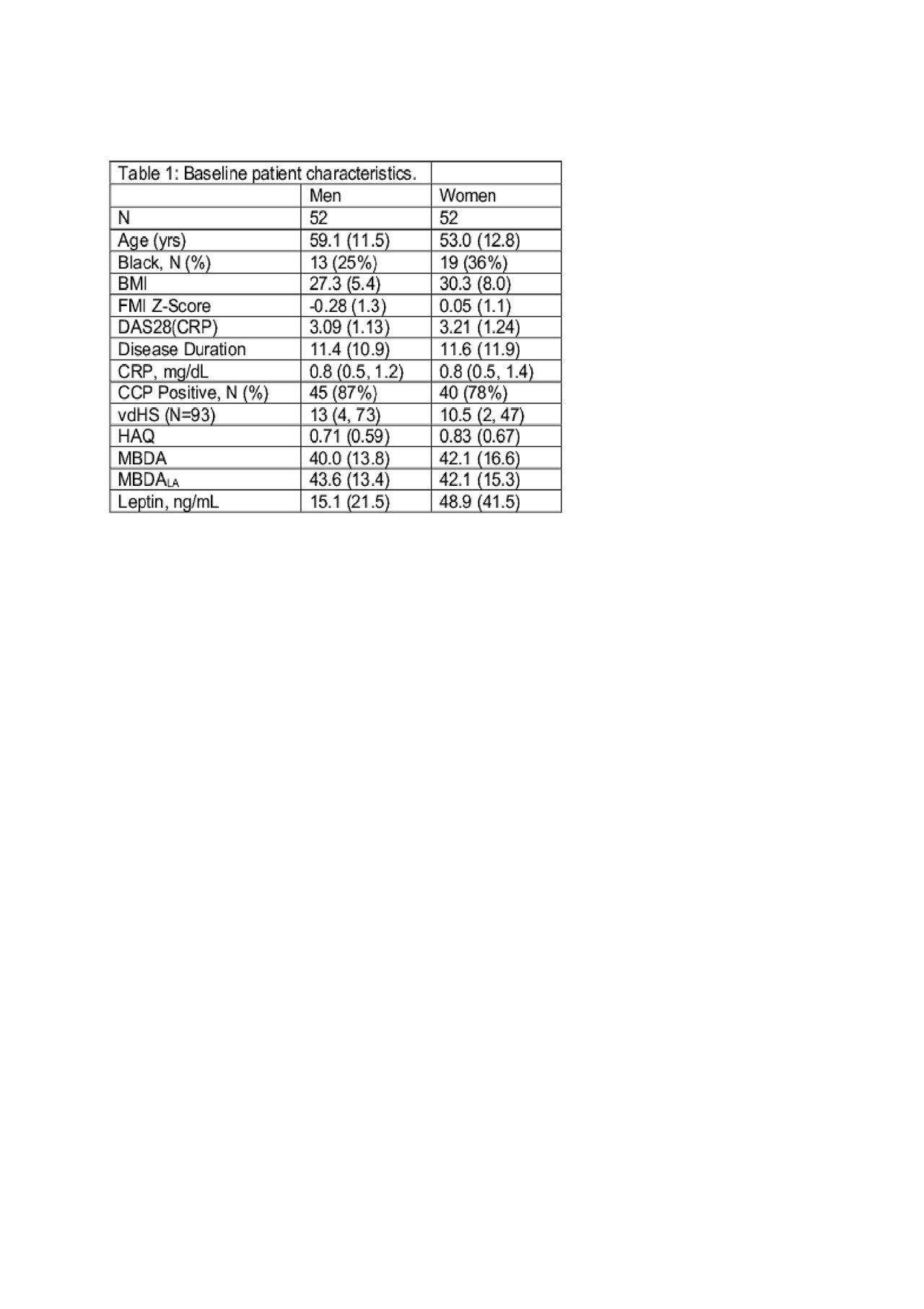Session Information
Date: Monday, November 11, 2019
Title: RA – Diagnosis, Manifestations, & Outcomes Poster II: Treatments, Outcomes, & Measures
Session Type: Poster Session (Monday)
Session Time: 9:00AM-11:00AM
Background/Purpose: Obesity and excess adiposity influence inflammatory markers and bias assessments of disease activity, most notably among women. A leptin-adjusted multi-biomarker disease activity (MBDA-LA) score has been developed to account for the effects of age, sex and adiposity and improves prediction of radiographic damage progression. We aimed 1) to determine if the adjusted measure demonstrates a reduced association with adiposity, 2) to assess the impact of the leptin-adjustment on the score over the range of adiposity, and 3) to assess relationships between MBDA scores and clinical disease activity.
Methods: Patients with RA, ages 18-75 years, were recruited from clinical practices and completed whole-body DXA to quantify fat mass indices (FMI, kg/m2). Age-, sex-, and race-specific Z-Scores were calculated based on the distributions in a healthy reference population. Clinical disease activity was assessed with the CDAI and swollen joint count. van der Heijde-Sharpe (vdHS) scores were determined at baseline by a trained radiologist. MBDA assays were performed on stored serum samples. Descriptive statistics described relationships between the FMI Z-Score and the MBDA and the MBDA-LA. Clinical disease activity, swollen joint count (SJC), and radiographic damage were also compared across categories of MBDA scores.
Results: There were 104 participants (50% female) with mean (SD) age of 56.1 (12.5) and mean BMI of 28.8 (6.9) (Table 1). The unadjusted MBDA score was strongly associated with BMI among women (Women: Rho=0.46 [p< 0.001]; Men: Rho=-0.12), while the MBDA-LA was not associated with BMI in women, and was inversely correlated in men (Women: Rho=0.17; Men: Rho=-0.32 [p=0.02]). The unadjusted MBDA score was also strongly associated with FMI Z-Score among women (Figure) (Women: Rho=0.42 [p=0.002]; Men: Rho=-0.10; p for interaction=0.01). The MBDA-LA was not significantly associated with FMI Z-Score in women or men (Female: Rho= 0.17; Male: Rho=-0.26). Leptin-adjustment reduced the MBDA score in the highest quartile of FMI in women but not men, and increased the MBDA score in the lowest FMI quartiles in both women and men (Figure); these patients in the lowest FMI quartile had the highest median swollen joint counts (p=0.05 for men, p=0.78 for women) (Figure). The MBDA-LA reclassified 4 women (8%) and 9 men (17%) into higher disease activity categories, and reclassified 2 women (4%) and 2 men (4%) into lower categories. CDAI, SJC, and radiographic scores were similar across activity categories for the unadjusted MBDA score and MBDA-LA (Table 2).
Conclusion: Leptin-adjustment of the MBDA score reduces bias related to excess adiposity in women with RA. The adjustment results in lower MBDA scores in women with greater adiposity, and higher MBDA scores in women and men with lesser adiposity. The use of the MBDA-LA may reduce misclassification due to excess adiposity and improve identification of active disease among patients with lower adiposity. High MBDA-LA scores among men with low adiposity may reflect severe disease or excess comorbidity in this group.
To cite this abstract in AMA style:
Baker J, Curtis J, Chernoff D, George M. Leptin-adjustment of the Multi-biomarker Disease Activity (MBDA) Score Reduces the Influence of Adiposity [abstract]. Arthritis Rheumatol. 2019; 71 (suppl 10). https://acrabstracts.org/abstract/leptin-adjustment-of-the-multi-biomarker-disease-activity-mbda-score-reduces-the-influence-of-adiposity/. Accessed .« Back to 2019 ACR/ARP Annual Meeting
ACR Meeting Abstracts - https://acrabstracts.org/abstract/leptin-adjustment-of-the-multi-biomarker-disease-activity-mbda-score-reduces-the-influence-of-adiposity/



